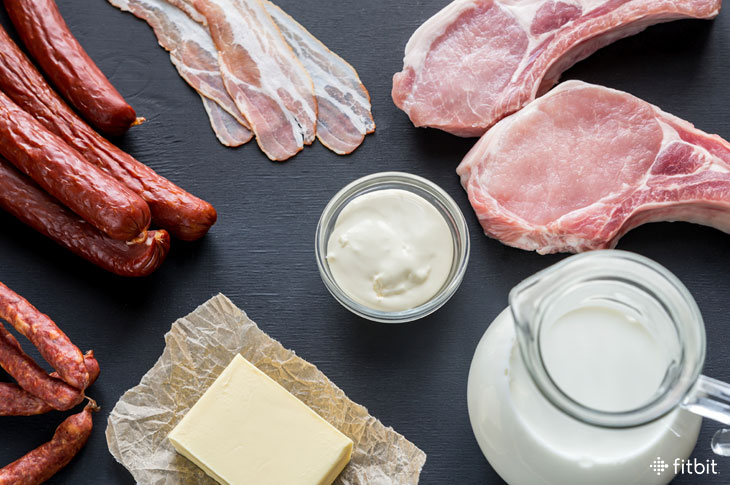
It seems everyone is confused about fat these days, and for good reason. Over the past several decades, both cholesterol and saturated fat have been labeled as bad. The experts have now lightened up about cholesterol, so you can enjoy those eggs! But saturated fat is more controversial and confusing—some people are still avoiding beef and butter, while others swear by coconut oil.
Research shows that saturated fats can’t solely be accused of hurting your heart—that whole idea grossly downplays the complexity of heart disease. We know refined carbohydrates and sugar are big bad factors, too. The truth is that saturated fats are complicated! They play vital, beneficial roles in your health, but they’re not all created equal. That being said, you most likely consume more than enough to meet your needs, so you probably don’t need to increase your intake.
The Facts About Saturated Fat
It’s not as simple as good and bad. Saturated fats are actually a group of individual fatty acids, each affecting our health differently. All fats and oils we eat are made up of a combination of unsaturated and saturated fatty acids (SFAs) in varying proportions, so you couldn’t completely cut saturated fats out of your diet, even if you wanted to! And as nutrition researcher and food industry consultant Beth H. Rice Bradley, PhD, founder of Foodsense, LLC, puts it, “Whole, healthy foods should not be vilified because of a single nutrient in them.” Be it from butter or beef fat, olives or avocados, saturated fats are in your food.
The fats in your diet, more so than the cholesterol in your diet, do impact your blood cholesterol levels. You may have heard of HDL “good” cholesterol versus LDL “bad” cholesterol. HDLs help to sweep cholesterol from your bloodstream, lowering your risk for heart disease. For simplicity’s sake, the guidelines are to keep your HDL above 40 mg/dl (milligrams per deciliter) and your LDL under 130 mg/dl, with a total blood cholesterol level of under 200 mg/dl. However, having a doctor assess your total personal risk factors for heart disease is most important.
What does that actually look like on your plate? Well, evidence indicates that some saturated fatty acids are harmful, whereas others appear to be … fine. The saturated fats found in beef, dark chocolate, coconut oil, and full-fat dairy, for example, appear to have a neutral effect on our health. At the same time, other saturated fats remain suspect in contributing to inflammation and heart disease, particularly when paired with highly refined carbohydrates. Suffice it to say, donuts and double-stuffed cookies do more harm than good.
Harmful Fats: Foods to Avoid
Humans have a taste for fat. It’s basic survival instinct, but in modern society, calories aren’t scarce. There is no free pass with fats, which are higher in calories than carbs or protein, and you don’t want to consume in excess of what your body needs.
Trans fats from partially hydrogenated oils are the one type that’s worth avoiding like the plague—read ingredients lists on fried and baked goods like donuts, cakes, biscuits, frozen pizza, cookies, and stick margarine. In contrast, fully hydrogenated oils don’t contain trans fats, but they are commercially made saturated fats, not naturally occurring in whole foods. Conventional peanut butters commonly fall in that category.
When looking more closely at saturated fats in the American diet, the worst foods are commercially prepared, deep-fried, and ultra-processed. They come packaged with other harmful ingredients like a variety of added sugars and sodium, creating an additive negative effect on your health. Fast-food favorites are a double-whammy: they’re cooked in questionable oils to begin with (veggie oils high in omega-6 fats), which are repeatedly heated to high temperatures, producing harmful compounds.
Processed foods high in saturated fats can include the following:
- Pizza
- Donuts
- Cakes
- Hot dogs
- Burgers
- French fries
- Chips
- Ice cream
- Milk chocolate bars
- Dairy and non-dairy coffee creamers
Foods with Saturated Fats that Are Okay in Moderation
Certain whole, natural foods also contain saturated fats, and these are okay to enjoy in moderation. The various saturated fatty acids found in whole foods have important biological functions, including having antimicrobial effects, potentially preventing cancer, and providing fuel for the heart. If you have an overall healthy diet, you can have a little bit of butter or coconut oil daily, but think in terms of teaspoons, not tablespoons. The recommended intake is to get 10 percent or less of your daily calories from saturated fat. So know your serving sizes, and enjoy the right portions.
- Red meat (lean beef, pork, and lamb)
- Poultry
- Fish
- Eggs
- Butter
- Dairy (milk, cheese, yogurt)
- Coconut oil
- Nuts and seeds
Variety is important when it comes to fats, and you really want to be consuming a range of healthy fats from avocados, olives, extra-virgin olive oil, nuts, and seeds.
The days of fearing all fats are gone—but even if saturated fats aren’t as bad for us as we once thought, they’re not all created equal. Rather than getting caught up in specific nutrients, think about your diet overall. By eating a variety of whole foods, you’ll get enough of both saturated and unsaturated fats without overdoing it or stressing about it. You can enjoy your beef, butter, coconut oil, fresh cheese, and dark chocolate in small amounts, as long as you’re also eating lots of vegetables, fruits, legumes, whole grains, nuts, seeds, extra-virgin olive oil, and fish. The real message is not that saturated fat is all bad or all good. It’s that fat is complicated, and we’re still learning about all of the ways it affects your heart, health, and happiness. But triple meat pizzas, cheesy fries, and donuts don’t do a body good no matter how you spin it!
This information is for educational purposes only and is not intended as a substitute for medical diagnosis or treatment. You should not use this information to diagnose or treat a health problem or condition. Always check with your doctor before changing your diet, altering your sleep habits, taking supplements, or starting a new fitness routine.

I am 63 years old, six foot tall, and weight around 177 pounds. I lift weights 4 times a week, and do balance and stretching 4-5 times per week. A recent blood test showed “normal” levels except LDL was 146. Doctor recommended diet and exercise. I thought I was eating healthy – plenty of fruits and veggies, but also red meat and chicken and eggs (hard boiled) and occasional fish (very little junk food and no alcohol). But after investigating LDL information, it looks like I eat too much saturated fat, and do not do enough cardio. I would like to know what is the “right” amount of saturated fat in a diet and can my fitbit measure saturated fat by itself? I have had it measure fat. My goal is to lower LDL as much as possible. Thanks, Tom